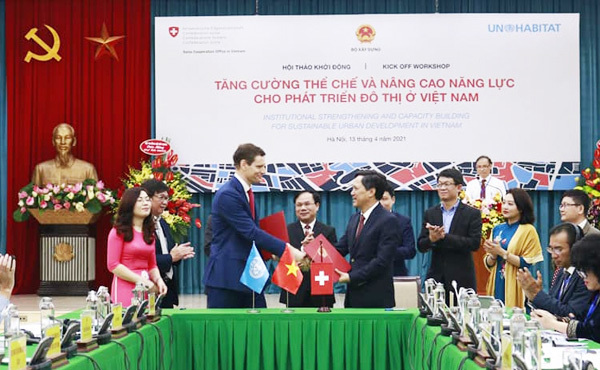 |
| International Cooperation and Development Leadership at the Swedish Embassy Marcel Reymond and Deputy Minister of Construction Nguyen Van Sinh sign an agreement on providing non-refundable aid for institutional strengthening and capacity building for sustainable urban development in Vietnam, Hanoi, April 13, 2021. |
The information was released at the kick-off workshop on institutional strengthening and capacity building for sustainable urban development in Vietnam, which was held on April 13 in Hanoi.
Vietnam's urbanization rate was at 34.4% in 2019. The figure is forecasted to reach 51.1% by 2045, according to the statistics of the UN.
Key urban areas have created an impetus for the nation’s economic growth and development, contributing 70% of the total GDP.
By the end of 2020, there was 859 urban areas across the country, 57 ones more than the 2016 figure. The urbanization rate attained 39.3%, up 3.6% against in 2015.
The percentage of urban population provided with clean water increased from 76% in 2010 to 86% in 2020 while the percentage of solid waste which were collected and handled achieved 87.5%.
The same day, the Swedish Government financed CHF4.25 million through the State Secretariat for Economic Affairs (SECO) in non-refundable aid for institutional strengthening and capacity building for sustainable urban development in Vietnam.
Of the total funding for the 2020-2025 project, 3.8 million CHF will be managed by UN-Habitat while 450,000 CHF will be under the management of SECO.
The main goal of the project is to strengthen the capacity of national and local institutions to promote, plan, and implement innovative and participatory solutions for sustainable urban development in Vietnam.
The project will be implemented in five years by UN-Habitat in close coordination with the Ministry of Construction, the Ministry of Planning and Investment, and city governments.
VGP

Hanoi's suburban districts need better planning
The urbanisation process in the outskirts of Hanoi is posing challenges in construction planning, including a lack of technical and social infrastructure, traffic congestion, floods and suspended projects.